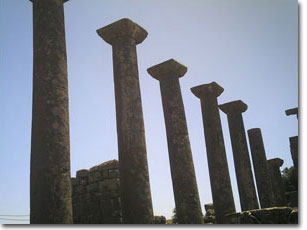| 100 km south east of Damascus is a site of considerable interest. Its
first historical mention dates to the reign of Herod the Great around
the first century BC when Nabatean Arab forces inflicted a humiliating
defeat in the Jewish forces.  From Pompey's time until the period of Trajan, it was listed as one of
the cities of the Decapolis, a loose federation allowed by the Romans
to retain some degree of civic autonomy. Incorporated into the province
of Syria (1st century), it was titled Septima Canatha by Septimus
Severus and transferred to the province of Arabia at end of the second
century. Christianity flourished in the fourth and fifth centuries and
it became the seat of the bishop. The town fell to the Arabs in 637,
after Damascus' capture, and then declined. It was virtually deserted
by the mid 19th century. Most of the ruins belong to the Christian period, especially the
renovated parts of the buildings and the additions that have been made.
We can see that the column decorations, that are surrounding the
platform of the sun god Helios' temple, are rich as in the
Baalbek/Palmyra tradition. |